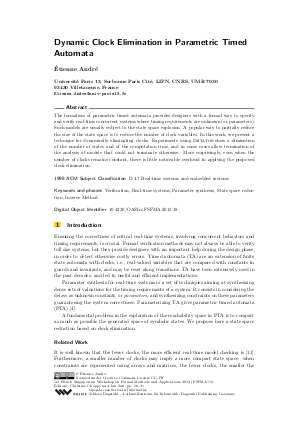Dynamic Clock Elimination in Parametric Timed Automata
Author Étienne André
-
Part of:
Volume:
1st French Singaporean Workshop on Formal Methods and Applications (FSFMA 2013)
Part of: Series: Open Access Series in Informatics (OASIcs) - License:
 Creative Commons Attribution 3.0 Unported license
Creative Commons Attribution 3.0 Unported license
- Publication Date: 2013-07-14
File

PDF
OASIcs.FSFMA.2013.18.pdf
- Filesize: 0.56 MB
- 14 pages
Document Identifiers
Subject Classification
Keywords
- Verification
- Real-time systems
- Parameter synthesis
- State space reduction
- Inverse Method
Metrics
- Access Statistics
-
Total Accesses (updated on a weekly basis)
0PDF Downloads0Metadata Views
Abstract
The formalism of parametric timed automata provides designers with a formal way to specify and verify real-time concurrent systems where iming requirements are unknown (or parameters). Such models are usually subject to the state space explosion. A popular way to partially reduce the size of the state space is to reduce the number of clock variables. In this work, we present a technique for dynamically eliminating clocks. Experiments using IMITATOR show a diminution of the number of states and of the computation time, and in some cases allow termination of the analysis of models that could not terminate otherwise. More surprisingly, even when the number of clocks remains constant, there is little noticeable overhead in applying the proposed clock elimination.
Cite As Get BibTex
Étienne André. Dynamic Clock Elimination in Parametric Timed Automata. In 1st French Singaporean Workshop on Formal Methods and Applications (FSFMA 2013). Open Access Series in Informatics (OASIcs), Volume 31, pp. 18-31, Schloss Dagstuhl – Leibniz-Zentrum für Informatik (2013)
https://doi.org/10.4230/OASIcs.FSFMA.2013.18
BibTex
@InProceedings{andre:OASIcs.FSFMA.2013.18,
author = {Andr\'{e}, \'{E}tienne},
title = {{Dynamic Clock Elimination in Parametric Timed Automata}},
booktitle = {1st French Singaporean Workshop on Formal Methods and Applications (FSFMA 2013)},
pages = {18--31},
series = {Open Access Series in Informatics (OASIcs)},
ISBN = {978-3-939897-56-9},
ISSN = {2190-6807},
year = {2013},
volume = {31},
editor = {Choppy, Christine and Sun, Jun},
publisher = {Schloss Dagstuhl -- Leibniz-Zentrum f{\"u}r Informatik},
address = {Dagstuhl, Germany},
URL = {https://drops.dagstuhl.de/entities/document/10.4230/OASIcs.FSFMA.2013.18},
URN = {urn:nbn:de:0030-drops-40855},
doi = {10.4230/OASIcs.FSFMA.2013.18},
annote = {Keywords: Verification, Real-time systems, Parameter synthesis, State space reduction, Inverse Method}
}
